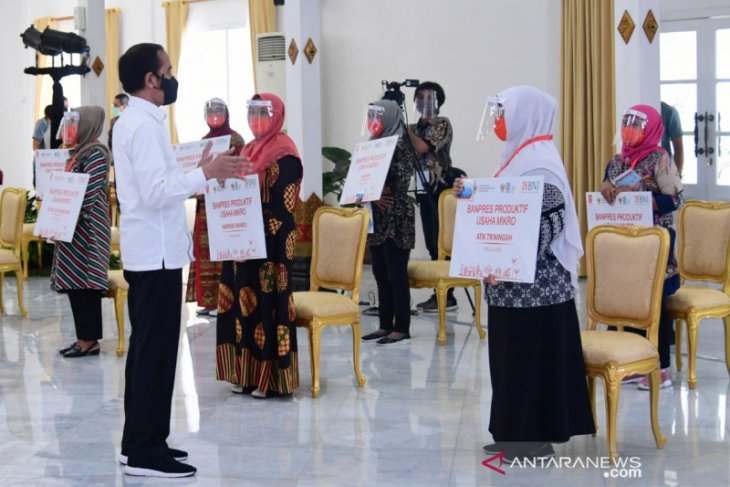Live Streaming
Program Highlight
Company Profile
Finance Ministry Outlines Three Strategies for Avoiding Recession
Written by Ani Hasanah
President Joko Widodo (Jokowi) interacts with recipients of productive presidential aid for micro-enterprises in Yogyakarta on August 28, 2020. (ANTARA/HO-BNI/sh)
The Finance Ministry is focusing on three strategies to keep Indonesia from plunging into a recession.
The three strategies are accelerating the National Economic Recovery (PEN) Program, and strengthening government consumption as well as public consumption, head of the Financial Policy Center of the ministry’s Fiscal Policy Agency (BKF), Adi Budiarso, said in a meeting with Commission VI of the House of Representatives, which oversees industry and investment, in Jakarta on Monday.
"Optimizing state expenditure has become important to stimulate the economy," Budiarso remarked.
Efforts are being made to expedite the implementation of the PEN program by improving budget absorption, especially for the program, which has been included in the budget execution list (DIPA), he elaborated.
As of August 26, 2020, budget absorption for the national economic recovery program has reached Rp192.53 trillion, or 27.7 percent of the allocated budget of Rp695.2 trillion.
To increase state consumption and thereby encourage economic growth, the government has accelerated the disbursement of the 13th-month salary to civil servants, Budiarso said.
Good expenditure, he said, is targeted to support the implementation of the new work-from-home (WFH) system and the digitalization of bureaucracy.
Capital expenditure would be reallocated to support the development of infrastructure for public service digitalization and the relaxation of the policy on good and services procurement.
To improve public consumption, he said, the government has accelerated expenditure on social aid, among other steps, by increasing the amount of aid, its frequency, and then extend the period of disbursement.
Currently, the government has disbursed Rp2.4 million per person in productive aid to 12 million micro, small, and medium enterprise owners.
The government has also provided aid to formal workers earning a salary of less than Rp5 million per month, along with a microloan (KUR) rate subsidy. (ANTARA)



